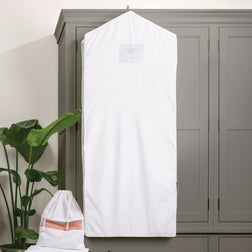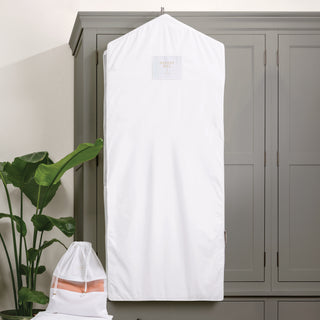Taking care of your cashmere clothing may require a few extra steps and a small investment in the items necessary for cleaning and storing the items safely, but it’s well worth the time and effort to keep your luxury items for years to come.
Fashion designer Hubert de Givenchy said, “All a woman needs to be chic is a raincoat, two suits, a pair of trousers and a cashmere sweater.”
Cashmere is easily the most luxurious and sought-after natural fiber textile. Cashmere is soft and lightweight and makes the lushest sweaters, cardigans, scarves, and throws.
With cashmere being one of the most coveted items in a woman’s closet, it’s important to know how to care for this textile properly.
That’s why we created this comprehensive guide to protecting and cleaning cashmere clothes - cashmere washing, drying, storage, and repair. In this guide, we will cover:
- Understanding cashmere fibre
- Dry cleaning cashmere
- Hand-washing cashmere
- Machine-washing cashmere
- Drying cashmere
- De-wrinkling cashmere
- Protecting cashmere against damage
- Storing cashmere
Your cashmere garments are undoubtedly dear to you and should be cared for with a great deal of consideration. Often expensive, always luxurious -- cashmere garments are a timeless fashion staple. This level of prestige calls for the very best practices in cleaning, storing and preserving clothes.
Why is Cashmere a Luxury Textile?
Cashmere has reigned supreme in the world of natural fibre textiles for thousands of years. It’s spun from the fine undercoat of Kashmir mountain goats located in the northern hemisphere, with the biggest herds located in China, Iran, Mongolia, and Afghanistan.
The process that takes the bushy winter fleece from around a goat’s neck and turns it into the softest cashmere is time-consuming and meticulous.
It begins in spring, when goats naturally shed their downy-soft double fleece that has grown through the winter to keep them warm. The undercoat can be shaved off, or preferably, combed through to release tufts of fleece to spin into skeins of yarn.
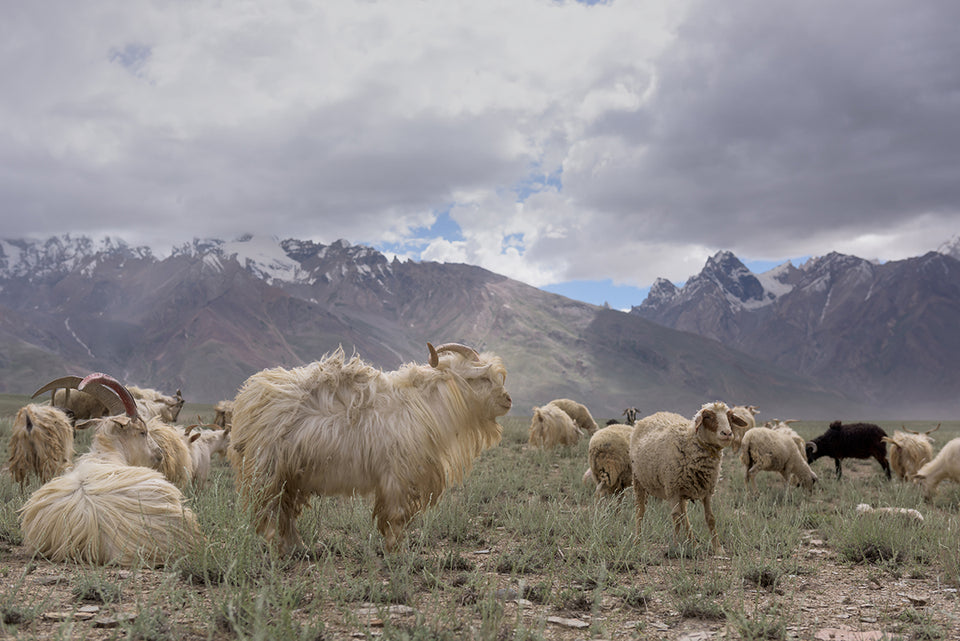
Once dyed, the yarn is woven into wearable textiles of all kinds, though scarves and sweaters made of cashmere tend to be the most commonly purchased garments.
The quality of the final garment is influenced by many factors.
While any goat can produce the winter undercoat used to make cashmere’s woollen yarn, specific breeds - now called cashmere or pashmina goats - are known for possessing the softest undercoats.
In particular, herds from the Kashmir Valley, hemmed to the northeast by the Himalayas, are believed to produce the finest cashmere wool due to the individual hairs of their undercoat being longer and smoother as a result of their environment.
Another factor in the quality is how the wool is gathered. Cashmere wool that has been collected by a comb-through method is often regarded as having a finer quality and softer feel than cashmere gathered from shorn goats. This is because the hand-picked process results in fewer of the coarse guard hairs that shearing cannot easily avoid.
However, combing and de-haring the soft fleece can take one to two weeks, which is considerably longer than other methods.
Knowing how much work is involved in the production of cashmere textiles, it’s reasonable that an equal measure of care must go into cleaning and keeping these valuable pieces pristine.
Dry Cleaning Guidelines for Cashmere Clothes
Dry cleaning is so-named due to the use of solvents, rather than soap and water, to clean garments.
When deciding whether to dry clean your cashmere or hand wash it at home, there are a few things to keep in mind.
First, you should consult the label on your garment. If it explicitly states that the item should not be dry cleaned, it’s wise to follow its instructions to the letter. Dry cleaning solvents can be harsh on natural fibres like cashmere and cause a build-up that makes the piece look dull.
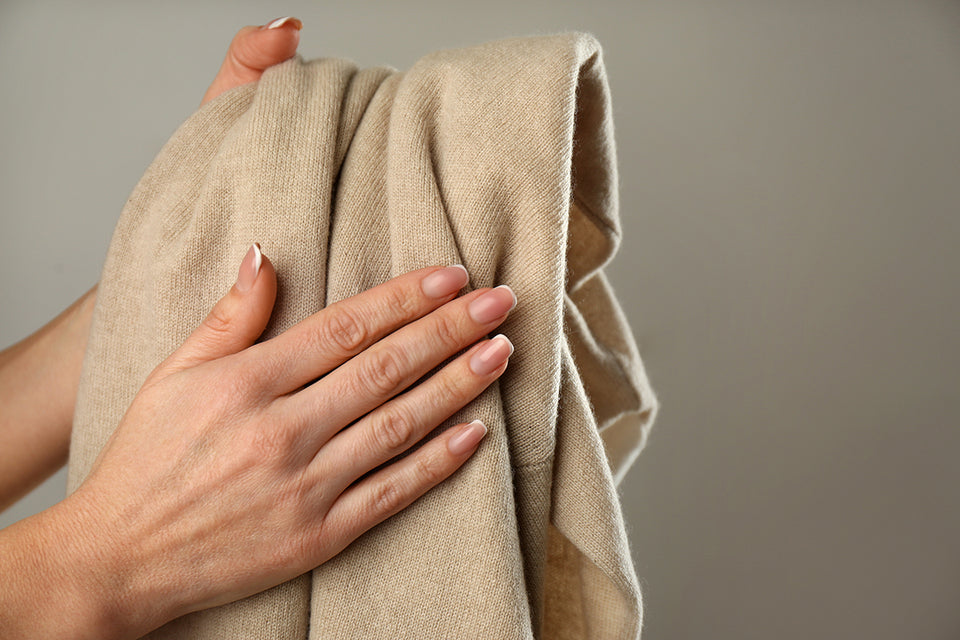
However, if your item has unsightly stains, taking it to the dry cleaner may be your best option to restore the piece to its former condition.
Cleaning Cashmere Garments at Home
The process of cleaning a cashmere garment yourself is not difficult, but it does require time to execute each of the steps with care.
Before washing your item, pre-treat any spots or stains with a cashmere-safe stain remover and turn the garment inside out. Then proceed to either hand- or machine-washing.
Hand-Washing Cashmere
Follow these steps for the best results when hand-washing cashmere. Take special care if the garment you are washing is 100% cashmere.
- Choose a mild detergent that is labelled safe for use on cashmere garments.
- Fill a clean sink or tub with lukewarm water and the appropriate amount of detergent based on the item’s size.
- Fully submerge the cashmere garment; agitate gently to move the soapy water through the clothing, but do not twist or rub the fabric.
- Allow the garment to soak for at least five minutes; soak longer if the garment is heavily soiled, but no more than 30 minutes.
- Rinse by running cool water over the garment until it runs clear.
- Avoid lifting the garment while sopping wet as this could stretch the fabric and cause it to become misshapen.
- To rid the item of excess water, squeeze it against the side of the tub or sink. Do not wring or twist the piece as this can damage the natural fibres of the wool.
Machine-Washing Cashmere
- Only machine-wash cashmere if the label states it’s okay, which is more typical of cashmere blends than pure cashmere garments.
- Only use washing machines that allow you to adjust temperature and cycle settings.
- Use a mesh laundry bag to reduce the chance of your garment snagging or stretching.
- Choose cashmere-safe detergents that can be used with machine washers.
- Water temperature should not exceed 104º F.
- Set the wash cycle to Delicates or Hand Wash.
- Choose the gentlest spin cycle, and start the washing machine.
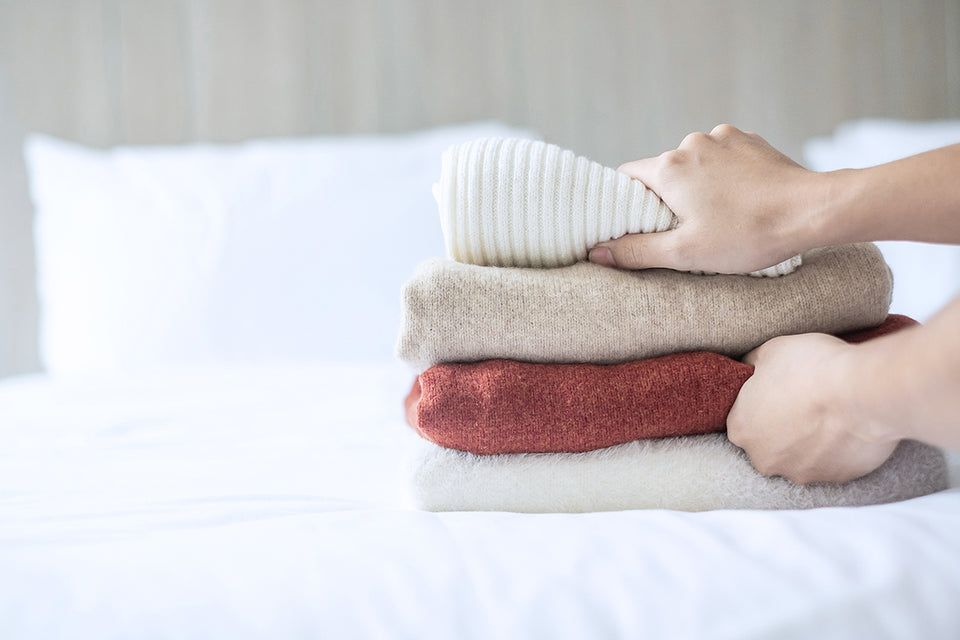
Drying Cashmere
Whether you choose to hand-wash or machine-wash your cashmere garments, special considerations need to be made when it comes to drying them.
Never tumble dry cashmere garments unless the label provides instructions on how to do so.
Natural fibres like cashmere are more vulnerable to damage and permanent stretching when wet, so extraordinary care should be taken while handling damp pieces. When drying a cashmere garment after washing, lay it out flat on a hard surface.
You can speed the drying process by placing a towel beneath the garment and another on top, then gently rolling up the sandwiched garment. The natural pressure this places on the garment will help squeeze the water out without causing the fabric to stretch.
De-Wrinkling Cashmere
As with other parts of the laundering process, consult your garment’s label for any warnings or instructions for ironing or steaming the cashmere piece. If ironing is listed as safe, it will certainly call for a low temperature setting.
You should also only iron a cashmere garment when it is turned inside out. This minimises the risk of the iron leaving a visible mark or causing pilling or pulling of the fabric’s fibres. When possible, steaming cashmere to straighten wrinkles is preferred.
Stain and Spot Removal of Cashmere Clothing
Never use bleach or products that contain bleach when removing spots on cashmere clothing. Even if the bleach product is colour-safe or heavily diluted, the harsh chemicals can degrade the natural wool fibres.
Some cashmere and wool-safe detergents can act as a spot treatment, but only use them in this manner if the label specifies appropriate instructions on how to use it in this way. Typically, the stain removal process with a detergent means applying an undiluted or heavily concentrated amount directly to the stained area and leaving it to sit for a few minutes.
When in doubt, take the garment to a dry cleaning professional if you have an especially stubborn stain. They should be able to help you determine if their solvents are safe enough for spot-treating a cashmere garment even if the solvents are not suitable to use to clean the entire garment.
Protecting Cashmere Garments Against Damage
Wear Layers Underneath
Textiles made from natural fibres like cashmere may be more likely to hold body oils and perspiration, which can cause yellowing and staining where it contacts the skin closely. The underarm area is particularly vulnerable to this kind of exposure.
Wearing thin, breathable clothing beneath your cashmere pieces, when possible, can help reduce its exposure to your natural oils.
Careful Handling of Cashmere
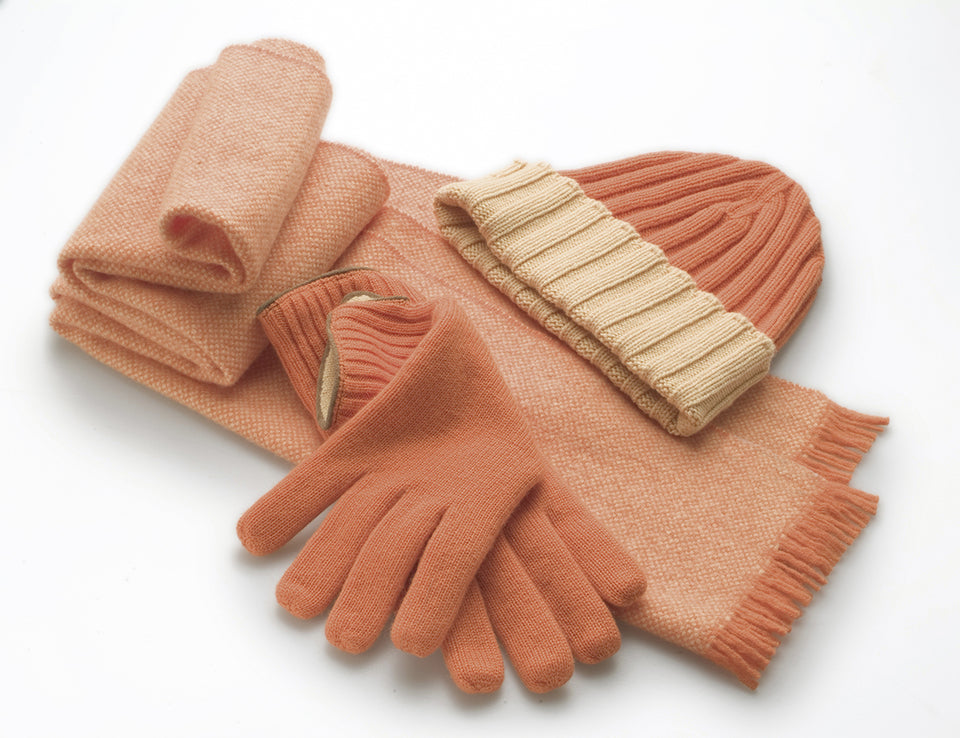
Mishandling is the number one reason cashmere garments become misshapen or ruined. If your garment has intricate beading or bright, colourful dye, you should always hand-wash it, even if the label says machine-washing or dry cleaning is safe.
This way, you can ensure you preserve every detail and keep your cashmere looking as good as new.
Use the Right Tools
Due to the short, natural fibres that make up cashmere wool, your garment may begin to pill in areas where it rubs together or as a reaction to washing and drying.
While this is normal for cashmere textiles, you’ll need to de-pill it carefully to avoid damaging the garment.
Invest in a specialty wool comb to help you manage this process safely.
Minimise Exposure
When not wearing or using the cashmere item, keep it out of direct sources of light and away from heat sources. Never store items near radiators, central air vents, or windows. Both heat and light are enemies of natural fabric clothing, especially cashmere.
Use Conditioner
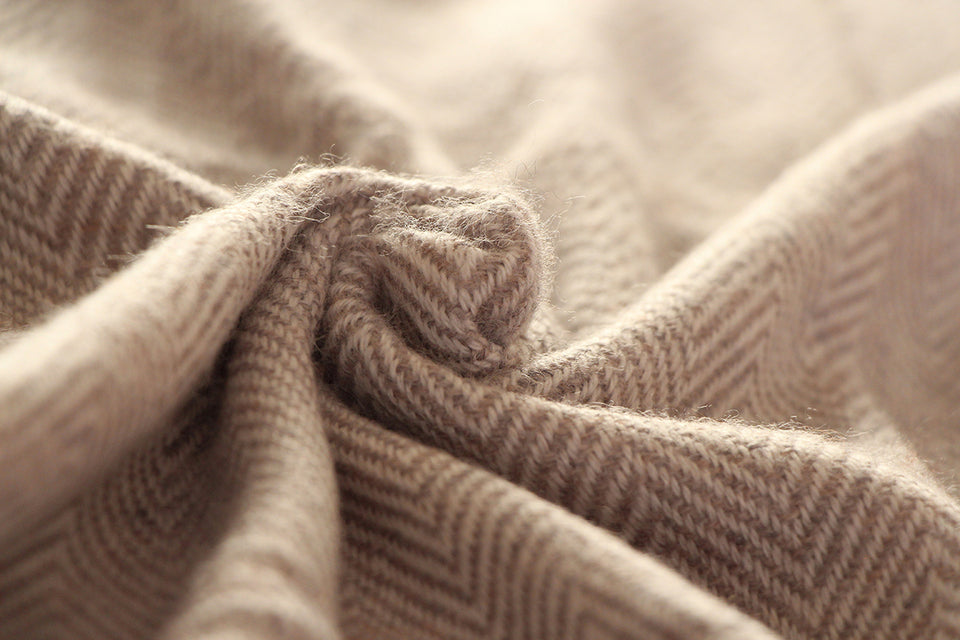
Cashmere or wool-safe softeners and conditioners can help keep your cashmere garments feeling soft and supple. Even mild detergents can strip away the natural oils that protect the individual hairs within each woven strand of yarn.
Replenish them with safe, gentle conditioners specifically formulated for use with this delicate textile.
Tips for Storing Cashmere Garments
Before you pack your beloved cashmere items up for the season, you should prepare the area where they’ll be stored ahead of time. Give every inch of the area a thorough dusting and disinfecting. Make sure the area is completely dry after cleaning.
Because cashmere clothing should never be hung, you will need storage solutions that allow you to fold the garments neatly and keep them protected but still able to breathe.
We recommend Hayden Hill garment storage bags to preserve the beauty of your clothing. Our bags are made of organic, soft cotton with a sheer, organza side panel so you can see your pieces while keeping them protected from light and dust. Hayden Hill delivers sustainable and beautiful garment care to protect what you love.
As added protection, place acid-free tissue paper between folded layers to reduce any possibility of pressure damage while in storage. Your storage space should also be out of direct light and heat, so choose a closet with a solid door and one that isn’t under a vent.
Finally, remember to protect your cashmere against clothes moths and other infestations. Once infested, clothes moths can be incredibly tricky to exterminate. That’s why it’s important to be proactive and take the necessary precautions to prevent moths. Use zippered storage bags that are made of breathable cotton.

Natural products like cedar wood blocks and lavender sachets are also great for repelling pests, but they only work when their oils are fresh, so be sure to replace or renew any that have lost their potency.
Taking care of your cashmere clothing may require a few extra steps and a small investment in the items necessary for cleaning and storing the items safely, but it’s well worth the time and effort to keep your luxury items for years to come.

